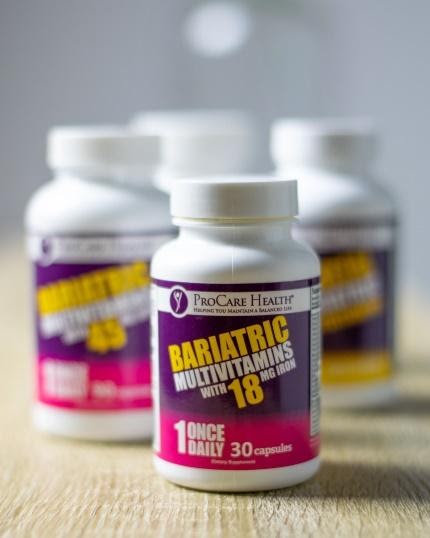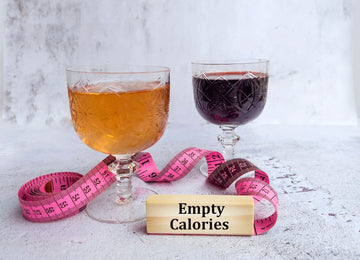by Anthony Benjamin on Oct 12, 2022

Keeping Up with Exercise, Nutrition, and Vitamins After Weight Loss Surgery
Regardless of who you are, it can be challenging to fall into a routine after weight loss surgery. You may struggle to get the nutrition and vitamins you need or to exercise every day without fail. At ProCare Health, we know it can be difficult to get used to your new lifestyle, which is why we have the tips and tricks you need to keep up with exercise, nutrition, and vitamins after weight loss surgery
Nutrition After Weight Loss Surgery
 To live
a healthy lifestyle and lose weight after bariatric surgery, you need to eat a well-balanced
diet with nutritional foods. Though your individual needs may be different, your doctor will
provide you with a specific diet
plan to follow after weight loss surgery.
To live
a healthy lifestyle and lose weight after bariatric surgery, you need to eat a well-balanced
diet with nutritional foods. Though your individual needs may be different, your doctor will
provide you with a specific diet
plan to follow after weight loss surgery.
Apart from following the post-bariatric diet, you should strive to develop healthy eating habits that last for years to come.
Stay Away from Liquid Calories
Your caloric intake is limited after weight loss surgery, which means you should stay away from liquid calories that are not on your post bariatric surgery eating plan. While the approved protein shakes and meal replacement drinks have the nutrition your body needs, other liquid calories provide no real nutrition and may slow your weight loss.
You should also avoid sugary and carbonated drinks since they can make your blood sugar climb, cause gas pain, and increase pressure in your stomach, which can be harmful to your staples.
Prepare Meals Ahead of Time
If you want to maintain your weight loss, you should incorporate meal prep into your weekly routine. Most times, two hours is sufficient, and you will see loads of benefits! By preparing meals in advance, you can save time and money without cooking individual meals every single day. Not starting a meal from scratch can be a welcome relief after a long day.
Keep in mind that cooking or preparing food in advance after surgery will result in more meals. For example, four large chicken breasts can be stretched out over eight meals. To keep your meals interesting try chicken with rice and peppers one day. The next day, serve chicken with rice and salsa. Then, eat chicken with lettuce, tomato, and a sprinkle of taco seasoning.
The changing flavors will keep your taste buds engaged. Try this strategy with other proteins you eat.
Be Careful When Dining Out
 Sometimes,
it can be impossible to avoid eating at restaurants or fast-food chains, especially if there
is a special occasion. However, if you plan ahead of time and make healthy choices, there’s
no reason you can’t enjoy a meal with family and friends.
Sometimes,
it can be impossible to avoid eating at restaurants or fast-food chains, especially if there
is a special occasion. However, if you plan ahead of time and make healthy choices, there’s
no reason you can’t enjoy a meal with family and friends.
When you eat out, use the following as a guideline:
- Choose grilled preparation for chicken, shrimp, and fish
- Box up half the meal when the server brings it to the table
- Order a smaller portioned appetizer for your meal
- Avoid “free” starters like chips and bread
- Steer clear of salads with creamy dressings, bacon bits, and cheeses
- Don’t add ketchup, honey mustard, BBQ sauce, mayonnaise, or other special sauces because of their high sugar content
- Chew your food thoroughly and pause between bites to slow your intake
If someone asks why you are eating so slowly, offers you a bite, or questions your portion size, come prepared with answers:
- I came for the conversation and to see your faces
- I had a late lunch (or breakfast)
- I have had enough and will enjoy the rest later
- I am not sure I can eat that yet
- Politely decline and change the subject by asking about a new job, puppy, kids, etc.
Make dining out about the company and not about the food.
Encourage Your Family to Eat Healthy
You may be tempted to cook two meals – one for yourself and one for your family. However, this can be time-consuming and exhausting. Instead, try cooking healthy meals that everyone can enjoy. Your family can add more sauce, have a larger portion, or choose a side dish that you will skip.
Eat Lean Proteins
After weight loss surgery, you should incorporate lean proteins such as turkey and chicken into your diet. Protein can help you maintain muscle mass while losing fat and help you feel fuller after your meals.
If you are unable to finish your meals, start by eating protein to make sure you’re taking in enough.
Avoid Mindless Snacking
Snacking is a dangerous habit that can slow your weight loss. Stick to high-quality meals and avoid processed foods. If you find yourself craving snacks, prepare healthy options ahead of time that you can quickly grab. Cottage cheese, fruit, cut veggies, or yogurt are good choices.
Vitamins After Weight Loss Surgery
 No
matter the procedure you undergo, it can be challenging to get the nutrition you need. By
taking vitamins after weight loss surgery, you can prevent nutritional deficiencies.
No
matter the procedure you undergo, it can be challenging to get the nutrition you need. By
taking vitamins after weight loss surgery, you can prevent nutritional deficiencies.
Gastric bypass, gastric sleeve, and gastric band surgeries require supplementation with a multivitamin, iron, and calcium plus additional vitamin D, vitamin C, and vitamin B12 supplements.
While you may feel overwhelmed by the number of supplements, there are several different ways you can incorporate vitamins into your diet after weight loss surgery.
Add Vitamins to Your Daily Routine
After weight loss surgery, it can be easy to forget about taking your vitamins every day. Many people find it best to keep vitamins in the place where you are most likely to take them (the kitchen or bathroom). Others find it helpful to keep a backup bottle at work in the event they forget to pack them before leaving the house.
Fortunately, there are other easy ways to incorporate vitamins and supplements into your everyday routine. For example, you can take a multivitamin with a light breakfast, or a dose of calcium with water on your way to work. You can also take calcium with dinner, and an additional vitamin before you go to bed.
The following schedule shows how you can work your vitamins into a typical day:
- Vitamin with your morning shake or light breakfast
- Calcium powder with water or tea on the way to work
- A couple cheese cubes for a mid-morning snack
- Sips of water until 30 minutes before lunch
- Chicken with rice and peppers for lunch
- Calcium chew with cottage cheese, fruit, or yogurt for an afternoon snack
- Sips of water until 30 minutes before dinner
- Vitamin (if needed) with a healthy dinner or a meal you’ve prepared in advance
- Calcium chew (if needed) in the evening
- Take any additional medication or vitamins before bed
Separate Calcium from Other Supplements
If possible, you should separate calcium from any other vitamins by a recommended minimum of two hours. Calcium can alter the absorption of other supplements like iron and vitamin B12. By separating calcium from other vitamins, you can also lower the risk of getting an upset stomach.
Don’t Mix Dairy with Multivitamins
Dairy products such as milk and ice cream can reduce the absorption of multivitamins. You should wait at least two hours between taking your multivitamin and eating dairy.
Keep Your Vitamins Nearby
If you’re running late in the morning, it can be easy to forget your vitamins. To prevent this, keep a supply of vitamins in your purse. You should also keep a back-up container in work so you can take vitamins throughout the day.
Remember that vitamins do not like heat and humidity. Keep the bottles closed and stored at room temperature or in a cool place.
Exercise After Weight Loss Surgery
 Bariatric
surgery can aid in weight loss, but it’s not the ultimate cure. To maintain or lose weight,
you must incorporate physical activity into your everyday routine. Try mixing up your
exercise routine with cardio as well as strength and flexibility training. Having a variety
of activities will help prevent boredom and can keep you motivated.
Bariatric
surgery can aid in weight loss, but it’s not the ultimate cure. To maintain or lose weight,
you must incorporate physical activity into your everyday routine. Try mixing up your
exercise routine with cardio as well as strength and flexibility training. Having a variety
of activities will help prevent boredom and can keep you motivated.
It can be difficult to make time for physical activity, especially if you have a full-time job or a family to take care of. However, there are small ways you can incorporate exercise into your everyday routine.
As you get settled into a routine, you will find ways to sneak in workouts throughout the day.
Make the Most Out of Your Lunch
Depending on how long your lunch break is, you probably have time for a short workout. Instead of eating your food immediately, go to the gym or take a short 20-minute walk. Then, you can eat when you are done. In addition to walking, wall sits and lunges engage several muscle groups and you don’t need equipment to raise your heart rate and get your muscles flexing.
Workout Throughout the Day
Instead of working out for a full 30 minutes, you can do small workouts throughout the day. Try walking up and down the stairs for five minutes in the morning and when you return home from work. Planks are another small exercise. They look deceptively easy but holding a two-minute plank (or longer) is a workout. From a short five-minute workout to a 10-minute walk after dinner, these small sessions will provide the same benefits as a longer workout.
Exercise After Weight Loss Surgery
 There are
several different types of exercise. If you choose a workout that does not interest you, it
will be difficult to motivate yourself and get moving. Instead, find a workout that excites
you – whether it be walking your dog or strength training at the gym. As you lose weight and
your body becomes used to exercise, try new activities like Zumba, kickboxing, karate,
rowing, and swimming (among others).
There are
several different types of exercise. If you choose a workout that does not interest you, it
will be difficult to motivate yourself and get moving. Instead, find a workout that excites
you – whether it be walking your dog or strength training at the gym. As you lose weight and
your body becomes used to exercise, try new activities like Zumba, kickboxing, karate,
rowing, and swimming (among others).
Drink Plenty of Water
When it comes to weight loss, hydration is key. You should drink 8 to 12 oz. of water every 20 to 30 minutes before your workout. You should also drink water throughout your workout to avoid dehydration.
Replace Your Running Shoes
 Shoes become less
absorbent and lose stability over time, which increases the risk of injuries. Make plans to
replace your running shoes every 300 to 400 miles.
Shoes become less
absorbent and lose stability over time, which increases the risk of injuries. Make plans to
replace your running shoes every 300 to 400 miles.
Be aware that as you lose weight you may notice your shoe size changes. This is normal. You may find that you will wear a size smaller or no longer need a wide width shoe
ProCare Health is Here to Help You
At ProCare Health, your health is our top priority. We provide you with a variety of products, from a multivitamin specifically designed for bariatric patients to other supplements that you need to stay healthy. We strive to provide you with only the best in quality because we know how important it is to your health and well-being. Feel free to contact us with questions or to place an order today!

Can You Drink Caffeine After Bariatric Surgery?

Can You Drink Alcohol After Bariatric Surgery?

How To Find Support Post-Bariatric Surgery

